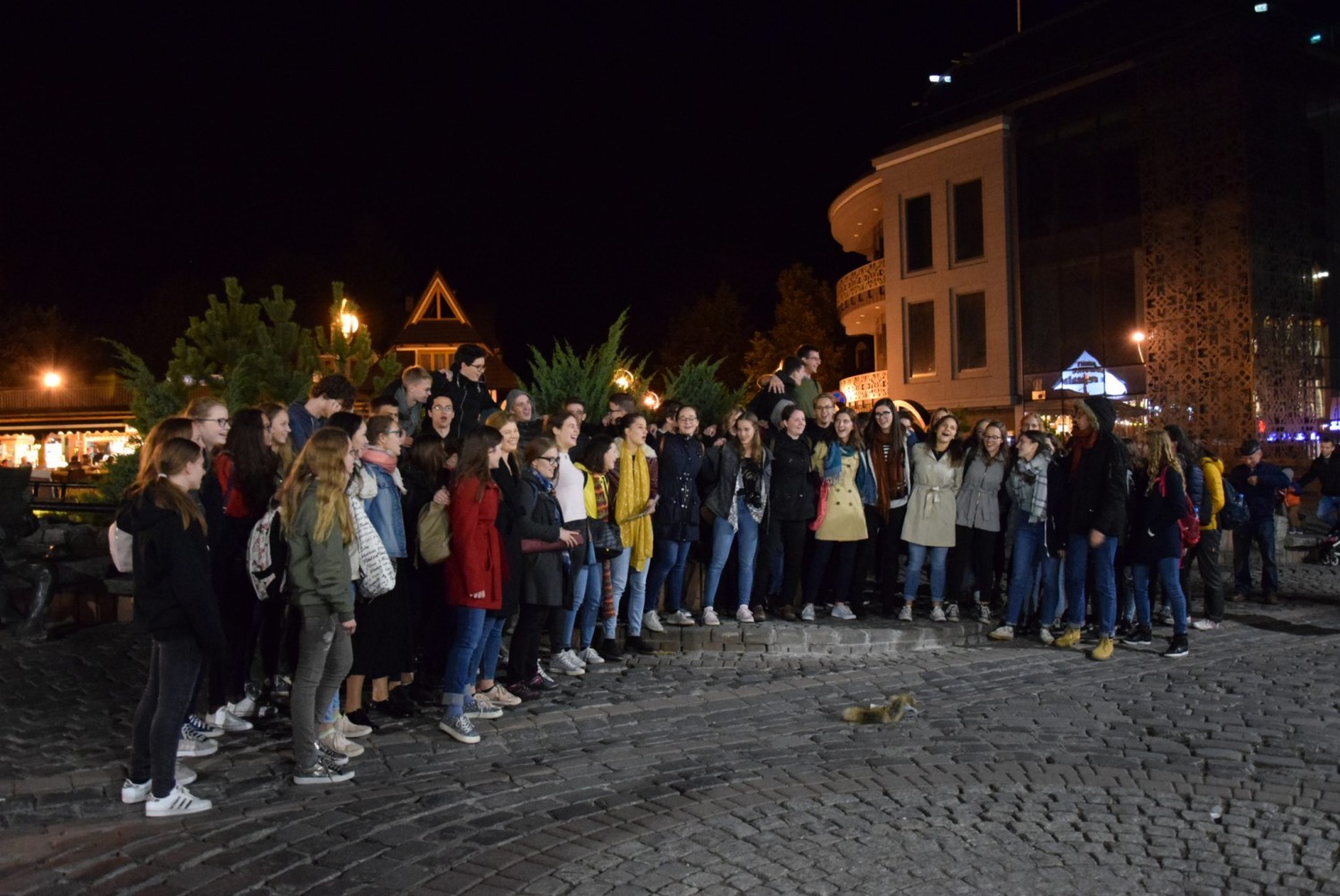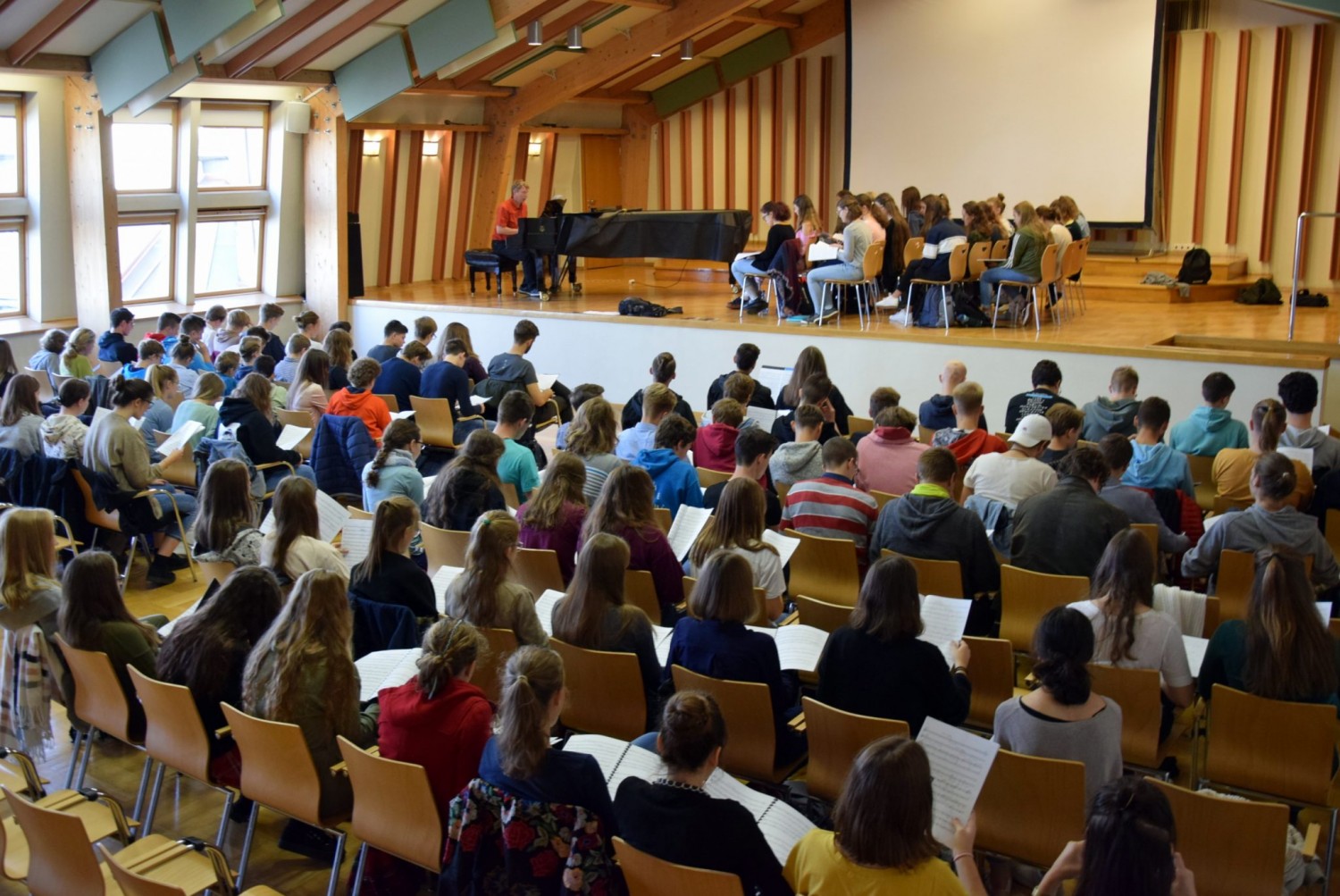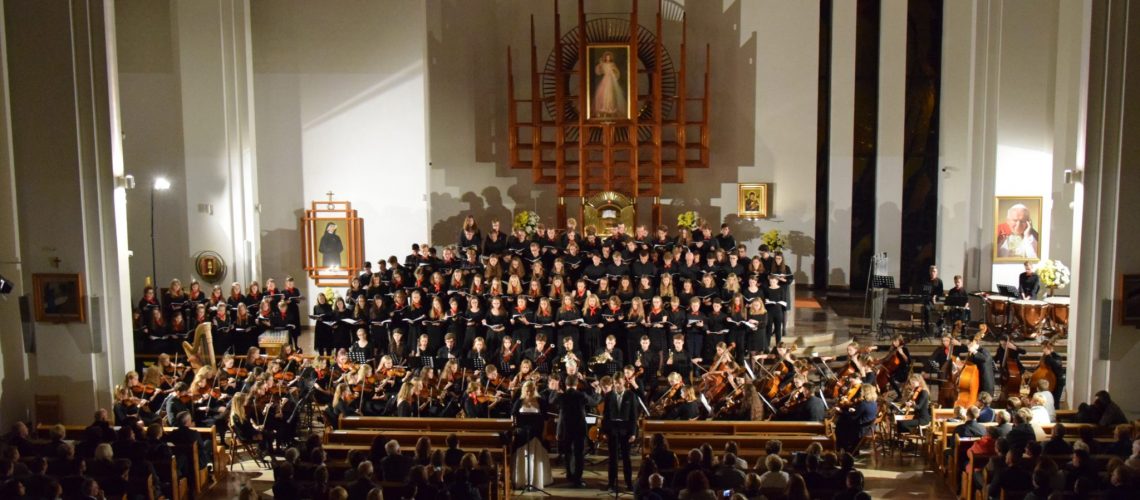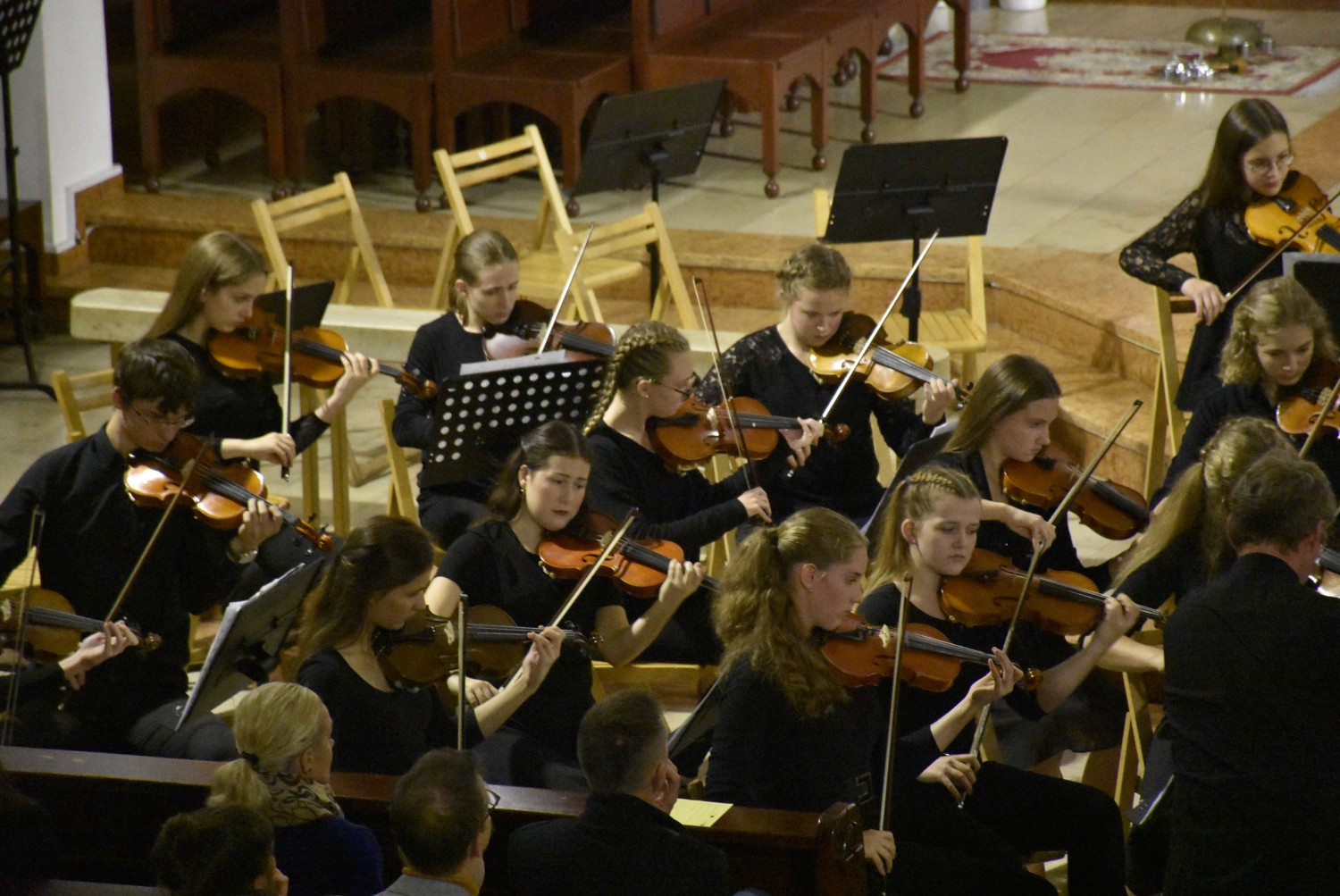Basic facts about the project:
Name od the project: Music to Life
Project Coordinator: Damijan Močnik
Start date: 1. 9. 2017
End date: 31. 8. 2020
Coordinating Institution: Zavod sv. Stanislava / St. Stanisalv’s Institution
Partner Institutions: Panstwowa Ogolnoksztalcaca Szkola Muzyczna II stopnia im. F. Chopina, Krakow, Poland
Project in the programme: Erasmus +, KA 2 (schools only)
General description of the project:
Music is one of the important fundaments of European cultural and art heritage, thus we believe it is necessary to take care of its development and progress. Music to Life is a common project meant to upgrade individual music making of the orchestra and choirs of the Diocesan Classical Gymnasium and Musical Gymnasium of Frederick Chopin from Krakow. The purpose of the project is also to get to know how individual countries work in the field of music; to prepare quality concerts, thus increasing students’ motivation to join the orchestra; to create music for the use of orchestras or choirs as well as design workshops for preschool children, which would encourage music making, enjoying music and promoting any positive impact music makes.
Part One: Music To life – Erasmus+ Exchange to Poland

On October 5th, the String Orchestra and St. Stanislav Youth Choir of The Diocesan Classical Gymnasium began their journey to Poland, where we’ll be a part of the Erasmus+ exchange Music to Life and will return the visit to the Polish students who visited St. Stanislav’s Institution in May 2018. Approximately 90 students and teachers got on the bus and set off at around 10 in the evening.
On Saturday morning we arrived to our first destination, Zakopane, a smaller city and famous winter resort. Excitement visibly filled us with energy and hid our lack of sleep caused by the night drive. After settling in our hotel we had some free time which most of us used to take a walk around the lovely town or hike up a small hill right above our hotel in order to enjoy the breath taking view of Zakopane. Saturday afternoon was the time for our first short concert in one of the local churches. The friendly audience gave us a huge round of applause and eagerly asked for another song although we weren’t too satisfied with our performance. We spent the rest of the evening exploring Zakopane by taking a walk through the city center, enjoying local food and live music in small cosy cafes.
On Sunday morning both the orchestra and the choir participated at the holy mass. After that, we impatiently waited to see what “lunch with a surprise” on our programs meant. We were more than thrilled to see horse carriages waiting for us! Local coachmen took us to a big meadow where Polish girls dressed in national costumes welcomed us with their traditional music. They set up fires on which we grilled our lunch while singing Slovenian and Polish songs. In the end we all sang to the melodies of Elvis Presley’s Can’t Help Falling in Love as one. This was a wonderful introduction to our least favourite part of the day – practice. We spent the rest of the afternoon working on our pieces and were proud to see some major improvement as hours passed.
All of us are having a wonderful time and are looking forward to our departure to Krakow where we’ll finally meet our Polish friends once again. /Anja Tršek, year 4/
Part two: Music to Life – Erasmus+: From Zakopane to Krakow, Poland

The second reporting from the music tour to Poland runs as follows: on Monday 8th October 2018, we said goodbye to Zakopane and proceeded our journey to Krakow. In the morning we drove to Wieliczka, where we visited the famous salt mines. We could see the underground corridors, learn about the history of mines, touch and taste rock salt and even sing in the fascinating concert hall the chapel of St. Kinga. Its carved walls and floors as well as chandeliers were absolutely impressive. In late afternoon hours we finally made it to our main destination, Krakow. Some students left with their host families, while the rest of us had lunch at the hotel. We spent the evening walking down the picturesque main square of Krakow and singing to people in the streets.
The next morning the orchestra and the choir made their way to the Polish conservatory where we had separate rehearsals. Later, the Polish students guided us through the Old Town and surprised us with some interesting legends about Krakow. During our free time we took some pictures, had a cup of coffee or one of the delicious famous doughnuts, maybe took a carriage ride and keenly absorbed Krakow’s lively life. The relaxed afternoon was followed by two intense hours of rehearsal for Rutter’s Mass of the Children, which we will perform on the main concert on Saturday. The start was chaotic as about 150 energetic musicians couldn’t concentrate and just kept chatting. However, by the end of the rehearsal, some parts of the magical melodies sounded quite promising.
On Wednesday morning we had some joint rehearsals again and were excited about the progress we had managed to make so far. The Slovene orchestra and the choir got on the bus once more and drove to Nowy Sacz, where we had our third concert. Having performed versatile melodies in the beautiful Town Hall, we had dinner and returned to Krakow to get some sleep for the rest of our busy tour in Poland. /Anja Tršek, year 4/
Part Three: John Rutter’s Mass of the Children – The Hightlight of Music Happening in Poland

Each of the final three days of our tour in Poland was a unique experience despite the somewhat monotonous schedule: breakfast, practice, lunch, practice, free time, concert. On Thursday night our music sounded off the walls of St. Florian Basilic in Cracow’s city centre, whereas Friday’s concert took place in Miechow. There we performed at the festival of the University of the Third Age, therefore our singing and playing were often interrupted by enthusiastic cheers of elderly ladies. :) Saturday finally came – that was the big day we had all been expecting for the entire week. After packing all our belongings and leaving the hotel, we had some more time to explore Cracow and enjoy the wonderful weather. As the evening was quickly approaching, we could all feel adrenaline working through us and as the final rehearsals weren’t what we had expected, our nervousness was getting only worse. However, our conductor and mentor advised us to relax, do our best and enjoy the good acoustics. The Divine Mercy Church was packed and full of expectation. After the Polish choir, it was time for the Slovenes to perform. After orchestra’s Concerto Grosso in B flat major by Georg Friedrich Handel the choir performed their varied palette of songs that included everything from Slovene folk melodies to spiritual pieces. What all of us had really been anticipating was actually the joint performance of all Polish and Slovene choirs and orchestras. John Rutter’s Mass of the Children was absolutely magnificent – the interlacement of fast and slow, joyful and melancholic intricate melodies created by the choirs, the symphonic orchestra and the soprano and baritone soloists touched everyone’s hearts and resounded in our ears throughout the magical evening. Still touched by the majestic last chord of Rutter’s masterpiece it was time for us to leave Poland and return back home. We are so thankful to have had the opportunity to collaborate with such talented young musicians, to make new friendships and get an insight into the Polish culture and lifestyle. I am sure every one of us could agree that each concert was a new unforgettable adventure. We are looking forward to playing music with our Polish friends in the future Music to Life exchanges. /Anja Tršek, year 4/
Erasmus+ Music To Life: STRING ORCHESTRA OF ST. STANISLAV’S INSTITUTION IN KRAKOW
Our school string orchestra, under the skilled mentorship of Drago Arko and conducted by the unmatched Damijan Močnik, went to Krakow for a week from 19th-25th October 2019 to participate in an Erasmus+ exchange with the Polish Conservatorium of Frederick Chopin. After our last rehearsal on Saturday evening we boarded the bus and departed towards Krakow. In the early morning we arrived to Katowice where we attended the Holy Mass and took a city tour and were rather astonished by its beauties. Then we visited the church of saint Faustina Kowalska and stood on top of the bell tower admiring the magnificent view of Krakow. Then we proceeded to our hostel which was in Krakows suburbs. With nothing to do, most went to sleep to prepare for the next day.
Monday arrived too soon and after breakfast we took the bus to the school where we had our first rehearsal with the Polish orchestra. After an exhausting 5-hour practise we had lunch and then were divided into several groups led by Polish students to take a Krakow city tour. The tours were indeed interesting and we learned quite a lot about the city and its people. Tuesday and Wednesday were pretty much alike. In the morning we had rehearsals with the Polish orchestra, then we had rehearsals of our own and finally lunch. Most of us spent both evenings enjoying Krakow nightlife while trying to be sufficiently rested for the next day. Finally Thursday came. The D day of our great concert in the church of the Blessed Aniela Salawa. First we had our solo performance, playing Corellis Sarabande, Gigue and Badinerie and 3rd and 4th Part of Benjamin Britten’s Simple symphony. Afterwards, the Polish came on stage and we played Sanjarija, Ave Maria and Meditation, at which Marjeta Banko blessed our ears with her deeply emotional and astonishing violin solo. Then our Polish colleagues took over, having their choir reinforced with a couple of our girls, and performed their parts. After the concert we felt exhausted but satisfied and once more we boarded the bus, this time taking us home. /Erazem Ivanc, year 4/
